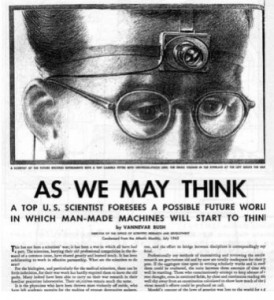Are These the Seminal Tech Books?
-
-
slice.mit.edu
- 1
Filed Under
Recommended
Madrigal and other editors compiled the list using more than 200 suggestions from tech writers and scholars on Twitter. Though he says the rankings are "approaching arbitrary," I included them anyway. Quoted passages are from the Atlantic's write-ups. And in case you find the list lacking or missed the call for ideas on Twitter, they're taking suggestions for round two.
#46—Don Norman '57, The Design of Everyday Things
 "Don Norman’s case for rethinking the way things are constructed to better serve people is a landmark in industrial design. He codified tenets of user-centered design that have become standard practice not just in designing stuff but digital interfaces." Norman, who received a degree in electrical engineering and computer science, is cofounder of the Nielsen Norman Group, retired Northwestern University professor, former VP of Apple Computer, and columnist for the design website Core77. His latest book, Living with Complexity, will be published by the MIT Press this month.
"Don Norman’s case for rethinking the way things are constructed to better serve people is a landmark in industrial design. He codified tenets of user-centered design that have become standard practice not just in designing stuff but digital interfaces." Norman, who received a degree in electrical engineering and computer science, is cofounder of the Nielsen Norman Group, retired Northwestern University professor, former VP of Apple Computer, and columnist for the design website Core77. His latest book, Living with Complexity, will be published by the MIT Press this month.
#41—Stewart Brand, The Media Lab Brand, who founded the first Hackers Conference, observed cutting-edge research at the Media Lab for three months in 1986 and penned this book.
#33—Steven Levy, Hackers: Heroes of the Computer Revolution Levy's book looks at how the hacker culture and ethic evolved, starting with the early mainframe hackers at MIT in the 1950s and 1960s.
#32—Fred Turner, From Counterculture to Cyberculture "Fred Turner’s scholarly treatment tells the story of the rise of digital utopianism. Turner focuses on Stewart Brand, editor of the Whole Earth Catalog and a Bay Area luminary in early computing culture. If you want to know where digital culture received its peculiarly libertarian and funky texture, this is the book to read." Now an associate professor at Stanford, Turner once taught communication at the Sloan School of Management.
#14—Leo Marx, The Machine in the Garden "Leo Marx’s literary treatment of the introduction of the machine into American life and letters is a foundational work in American history" and "shows that the internal conflicts Americans feel about the way technology allows us to transform the world have roots stretching back to the dawn of industrialization." Marx is senior lecturer and professor emeritus in the Program in Science, Technology, and Society.
#8—Vannevar Bush EGD '16, "As We May Think" In July 1945, 30 years before the invention of the personal computer and 50 years before the birth of the public World Wide Web, Vannevar Bush wrote this article for the Atlantic Monthly and proposed his idea for the Memex machine. The device was to be a way to sort through vast amounts of information—essentially describing modern hyperlinks. Bush wore many hats at MIT: he was a professor, VP, School of Engineering dean, MIT Corporation chair, and, of course, is the namesake of the Bush Room.
In July 1945, 30 years before the invention of the personal computer and 50 years before the birth of the public World Wide Web, Vannevar Bush wrote this article for the Atlantic Monthly and proposed his idea for the Memex machine. The device was to be a way to sort through vast amounts of information—essentially describing modern hyperlinks. Bush wore many hats at MIT: he was a professor, VP, School of Engineering dean, MIT Corporation chair, and, of course, is the namesake of the Bush Room.
#7—Langdon Winner, The Whale and the Reactor In this book, published 25 years ago, political scientist Langdon Winner "points out that while we fight tooth-and-nail over the paper Constitution, the equally life-shaping technical constitution of the nation is perceived as beyond the reach of social control." Winner was an assistant professor at MIT for a time.
#5—Thomas Hughes, Networks of Power "Thomas Hughes is perhaps the foremost historian of technology in the world," and in this book, he presents "the most comprehensive account of 'how the west was wired,' [using] electrification as a test case for a new general theory of technological system building." His work has informed examinations of how networks such at the Internet or railroads have developed. Hughes is a distinguished visiting professor of the history of technology in the Program in Science, Technology, and Society
#3—Norbert Wiener HM, Cybernetics: Control and Communication in the Animal and Machine A child prodigy who studied philosophy and zoology and received a PhD in math from Harvard, Norbert Wiener helped "elaborate and standardize the connections between systems of any kind, whether mathematical fictions or complex societies of organic animals." Wiener taught mathematics for many years at MIT and eventually became an honorary member of the Alumni Association.








Comments
Shelly
Wed, 11/03/2010 3:21pm
Great list of books!